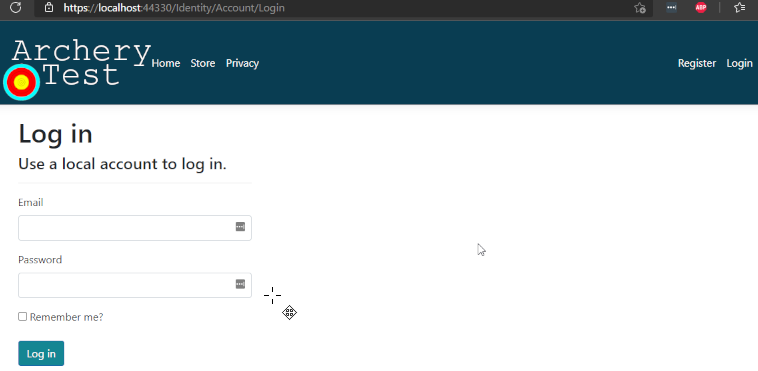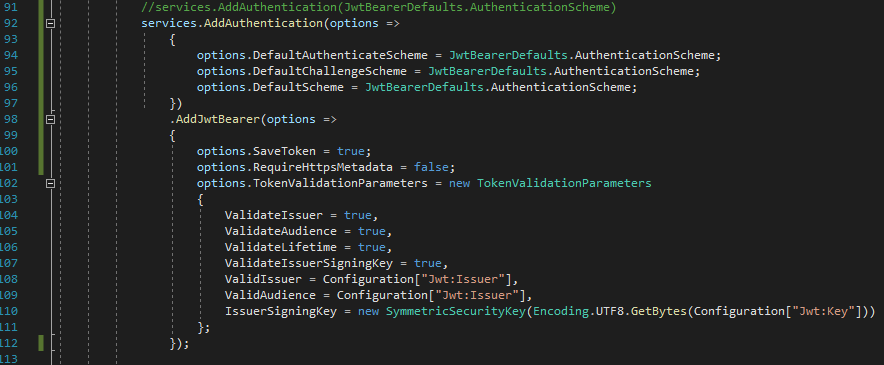You did not share code that creates the JWT or persists the token. Below is an example service to create the JWT in a Web API application. Can you explain the MVC security design? Are you using an authentication cookie to persist claims/roles or are you using a JavaScript application to persist the JWT? Can you explain your Web API security intent?
namespace JwtService.Services
{
public interface IApplicationUser
{
string Authenticate(string username, string password);
LoginResponse AuthenticateMvc(string username, string password);
}
public class ApplicationUser : IApplicationUser
{
private readonly IConfiguration Configuration;
public ApplicationUser(IConfiguration configuration)
{
Configuration = configuration;
}
private List<User> _users = new List<User>
{
new User { Id = 1, FirstName = "Hello", LastName = "World", Username = "username", Password = "password" }
};
public string Authenticate(string username, string password)
{
var user = _users.SingleOrDefault(x => x.Username == username && x.Password == password);
// return null if user not found
if (user == null)
return null;
// authentication successful so generate jwt token
var tokenHandler = new JwtSecurityTokenHandler();
var key = Encoding.ASCII.GetBytes(Configuration["JwtConfig:secret"]);
var tokenDescriptor = new SecurityTokenDescriptor
{
Subject = new ClaimsIdentity(new Claim[]
{
new Claim(ClaimTypes.Name, user.Id.ToString()),
}),
IssuedAt = DateTime.UtcNow,
Expires = DateTime.UtcNow.AddDays(7),
SigningCredentials = new SigningCredentials(new SymmetricSecurityKey(key), SecurityAlgorithms.HmacSha256Signature),
Issuer = "Issuer",
Audience = "Audience"
};
var token = tokenHandler.CreateToken(tokenDescriptor);
return tokenHandler.WriteToken(token);
}
public LoginResponse AuthenticateMvc(string username, string password)
{
var user = _users.SingleOrDefault(x => x.Username == username && x.Password == password);
// return null if user not found
if (user == null)
return null;
// authentication successful so generate jwt token
var tokenHandler = new JwtSecurityTokenHandler();
var key = Encoding.ASCII.GetBytes(Configuration["JwtConfig:secret"]);
var tokenDescriptor = new SecurityTokenDescriptor
{
Subject = new ClaimsIdentity(new Claim[]
{
new Claim(ClaimTypes.Name, user.Id.ToString()),
}),
IssuedAt = DateTime.UtcNow,
Expires = DateTime.UtcNow.AddDays(7),
SigningCredentials = new SigningCredentials(new SymmetricSecurityKey(key), SecurityAlgorithms.HmacSha256Signature),
Issuer = "Issuer",
Audience = "Audience"
};
var token = tokenHandler.CreateToken(tokenDescriptor);
//Mock response
LoginResponse response = new LoginResponse()
{
token = tokenHandler.WriteToken(token),
role = "User",
claims = new List<ClaimDto>()
{
new ClaimDto() {type = ClaimTypes.Role, value = "UserRole" },
new ClaimDto() {type= ClaimTypes.Email, value = "email@email.com" }
}
};
return response;
}
}
}


